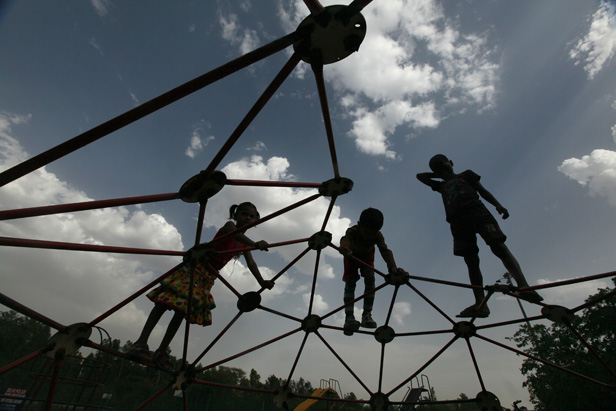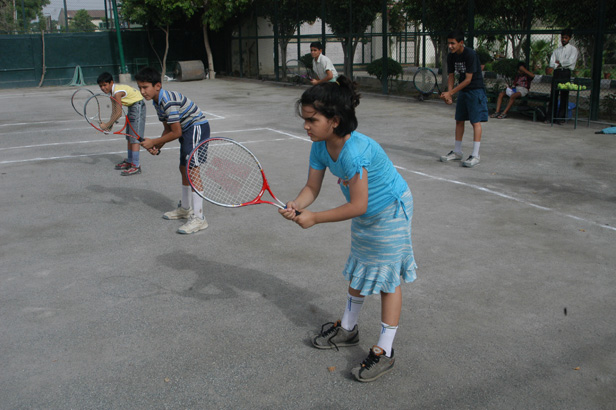It's never too early to start talking about equality with your children.
Despite the progress we've made as a society, a large majority of Indian families are still known to both enforce and maintain certain forms of gender bias in their daily lives often unconsciously as a result of years of social conditioning. "From delegating household chores to selecting toys for our children, our homes are often a perfect microcosm of the stereotypes and underlying patriarchy prevalent in the outside world," explains Nandita K, a PhD scholar at SOAS, London, whose thesis deals with recurring patterns of gender-based conditioning in South Asian families.
In a country like India, where tradition and cultural values still dominate household rules and rituals, it's no wonder than even the most progressive families sometimes see themselves falling back upon stereotypes particularly when raising children. As this eye-opening video from Tata Tea Jaago Re shows, even the most broad-minded of us are often guilty of subjecting our children to rigid stereotypes like girls cannot play sports or boys cannot cry.
At a time when gender inequality and violence against women are so widespread in our everyday lives, it is important to raise a future generation that is empathetic, responsible, and respectful towards all genders. And a paradigm shift in our society's attitude towards women and girls can only be brought about when parents treat their sons and daughters equally at home. This not only means equal opportunities in education and sport but also raising them without social cliches, such as when boys are shamed for losing a race to girls and girls are discouraged from climbing trees. We spoke to a few parents and experts in the simple ways in which one can drive home concepts of gender equality positively from a young age.
Look beyond stereotypes in media and retail
K. Lakshmi, a mother of two, a girl and a boy aged 6 and 4, from New Delhi insists on both vetting and the openly discussing any kind of content that her children consume, from storybooks in school to television news and internet videos. We're still surrounded by an entertainment industry that strongly gives in to gender stereotypes, and as teachers and parents it's important to point out the myths from the facts for the kids. "It's necessary to ask questions like 'why is mummy always doing the laundry in that ad?" she explains. "I often also point out examples of casual sexism even in storybooks where the women are always cooking in the background while men are off fighting wars." By understanding that stereotypes need to be questioned, children learn to develop a far more open mind and are consequently more united against gender bias when they see it later in their lives.
Similarly, Preeta Ghoshal, a Calcutta-based mother of 4-year-old Adi talks about how stereotypes are rampant in retail. "Any products for girls, whether it's a lunchbox or a t shirt will invariably have a princess on it whereas for boys it's either a superhero or star wars," she point out. As a parent, she tries to cut down this harsh demarcation as much as possible in allowing her son to experiment with whatever toys he fancies as long as it's within budget. "He and his cousin (2 years older) play with both her toys and his. So one day they're playing 'house' with her cooking set and the next day it is LEGO. The only thing I don't allow him to play with are guns."
Raising girls to be smart, not scared.
Nilima Achwal, founder of Iesha Learning, an enterprise that designs comprehensive sex education workshops for children, tells us how restrictive and potentially harmful it can be when we enforce different and far stricter rules over young girls in lieu of their safety. Besides being an open form of bias, she explains how this can affect their long-term self-confidence and instincts. "Different restrictions for girls in terms of going out and socializing, seeing friends, staying out late, is common in most households across India. However, what parents often don't realise is that it restricts the girls' social growth and ability to read situations, including the ability to be street smart and stay safe."

SOURCE: Hindustan Times
More importantly, children follow by example. When a boy finds that the rules meant for his sister do not apply to him, he believes that there's a lot he can get away with that girls cannot. Therefore, this not only leads to girls being under-confident, it also means raising a generation of entitled boys who can take advantage of this implied weakness.
Let's talk about consent…and respect
Safety is undoubtedly a top priority for most parents and having an open dialogue at home is crucial towards this end. It's never too early to talk to boys and girls about consent and boundaries, of allowing an atmosphere where they're comfortable sharing their doubts and fears about sex, relationships, and social structures. "Given where Indian society is right now, learning how to convey and receive a "no" is one of the most important things that parents can teach their boys and girls, believes Achwal. "It is the basis of consent."
It's equally important that kids be given the chance to draw their own comfort zones when it comes to boundaries and displays of physical affection. In turn, they too will grow up respecting the boundaries of others. Further, maintaining an atmosphere at home where children are used to seeing their parents respect each other and their roles in their lives is equally important. "The role of the mother can in no way be seen or implied to be inferior to that of the dad's. This sense of healthy partnership and mutual trust and respect between parents is very important and goes a long way towards determining how a child sees gender roles in his own adult life," suggests Nandita.

SOURCE: Hindustan Times
Redefine the norms when it comes to household chores
Bangalore-based parents to a son (8) and daughter (5), Shweta Ashok and her husband Ashok K. are both full-time graphic designers who have a very gender-neutral policy when it comes to raising their kids. "Ashok works out of home as a freelancer since I have 9-t0-5 hours, so our kids have grown up seeing both of us share household chores, drive them to school and back, and cook and put away dinner," says Shweta. The same rules apply to the children as well; they're both responsible for keeping their room clean and both are entitled to equal hours of playtime.
Limiting household chores to gender leads children to believe that only women are designated for housework, when in reality, most modern households run on a system of shared chores and responsibilities. The day boys realise that they must learn how to make a proper meal and girls agree that it's important to fix a leak and change a tyre; parents can truly pat themselves on the back.
By Sudarshana Sengupta for HT Brand Studio
Gender inequality lies at the heart of an unsafe society. Join Tata Tea's movement to make gender sensitisation programmes compulsory in schools by signing the petition now. In addition, do pledge to raise gender-sensitive children and call out discrimination wherever you see it.